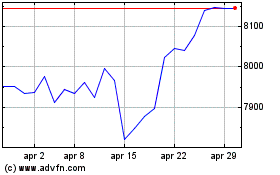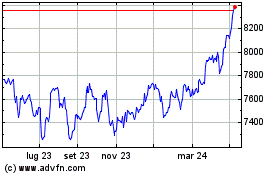Global Stocks Rise as Fears of Trade War Ease
21 Maggio 2018 - 3:05PM
Dow Jones News
By Jon Sindreu
-- U.S. dollar, 10-year Treasury yields up
-- Oil prices rise
-- Some European markets closed for holiday
Global stocks rose Monday as concerns about a trade war between
the U.S. and China eased.
Futures pointed to 0.6% and 0.9% opening rises for the S&P
500 and the Dow Jones Industrial Average, respectively, after Asian
stocks powered higher -- all of China's indexes notched gains and
Japan's Nikkei Stock Average closed up 0.3%.
In Europe, the Stoxx Europe 600 was up 0.4% in morning trade,
with markets in Germany and some other countries in the region
closed for a holiday. Britain's FTSE 100 rose 0.8% marking an
all-time high.
The WSJ Dollar Index, which measures the greenback against a
basket of currencies, was up 0.3% Monday, while yields on 10-year
Treasurys rose to 3.075%, from 3.067% Friday. Yields rise as prices
fall.
Money managers believe discussions between the U.S. and China
this weekend have helped to avoid an all-out trade war, a positive
development in their view. In an interview Monday, Treasury
Secretary Steven Mnuchin said the U.S. will suspend the $150
billion that it had previously threatened to levy on Chinese
imports.
The U.S. is set to complete the procedural steps to apply
tariffs on $50 billion of Chinese imports this week, and has
threatened to apply levies to a further $100 billion. While China
had pledged to retaliate, it has now agreed to purchase a larger
amount of American goods to help close the U.S. trade deficit.
Investors had never expected the announced tariffs to
significantly affect the world economy, but were concerned that
further tensions could lead to more countries erecting larger gates
on trade. Stocks have gained several times on the belief that trade
tensions were easing, only to fall back down as investors took the
opposite view.
"It's not in anyone's interests to have severe escalation," said
Caroline Simmons, deputy head of U.K. investment at UBS Wealth
Management, who believes investors won't ultimately put too much
weight on geopolitical spats. "It's noise; in the midterm, it's
going to come down to what's being delivered growth-wise and
earnings-wise."
While the global economy remains robust and first-quarter
earnings have been strong, stock markets have mostly traded
sideways this year because many investors have started to fear that
the pace of the expansion has already peaked.
"The muted market reaction to earnings is indicating that the
upside is priced in," said Witold Bahrke, senior macro strategist
at Nordea Asset Management, who favors U.S. stocks because he
believes equities overseas will be further dragged down by a
stronger dollar, higher Treasury yields and weakening economic
indicators in Europe.
"U.S. stocks are very liquid and they tend to be a good safety
bet, and in relative terms U.S. growth dynamics are still looking
kind of best-in-class," he said.
Meanwhile, spreads between Italian and German government bonds
continued to widen and Italy's FTSE MIB stock-market index dropped
0.3% Monday, a sign that investors remain concerned about
antiestablishment parties' advances in forming a new government.
While bond markets initially brushed off such worries, it has been
slightly rattled by recent revelations that the new government
could seek to threaten some of the eurozone's fiscal and monetary
rules.
Later this week, money managers will pay close attention to the
release of the minutes of the Federal Reserve's May policy meeting,
which are expected to shed further light on how fast officials are
likely to raise rates to react to higher inflation.
Yields on 10-year Treasurys rose to 3.072% Monday, from 3.067%
Friday.
Five-year market expectations of inflation have moved up over
the past month as oil prices rose to multiyear highs, but
longer-term measures of inflation expectations remain contained,
raising questions about how much the Fed will react to one-off
price increases.
On Monday, Brent crude futures, the global crude benchmark, rose
0.3% to $78.74 a barrel.
"The Fed has been saying for a while now that they expect
inflation to pick up," said David Slater, manager of Trium's macro
rates fund, who has a bet on short-term U.S. inflation edging
higher, but believes officials have already taken it into account
when communicating their interest-rate policy.
"I'm a bit surprised we've gotten to the place we are in 10-year
Treasurys, frankly," he added.
Write to Jon Sindreu at jon.sindreu@wsj.com
(END) Dow Jones Newswires
May 21, 2018 08:50 ET (12:50 GMT)
Copyright (c) 2018 Dow Jones & Company, Inc.
Grafico Indice FTSE 100
Da Mar 2024 a Apr 2024

Grafico Indice FTSE 100
Da Apr 2023 a Apr 2024
